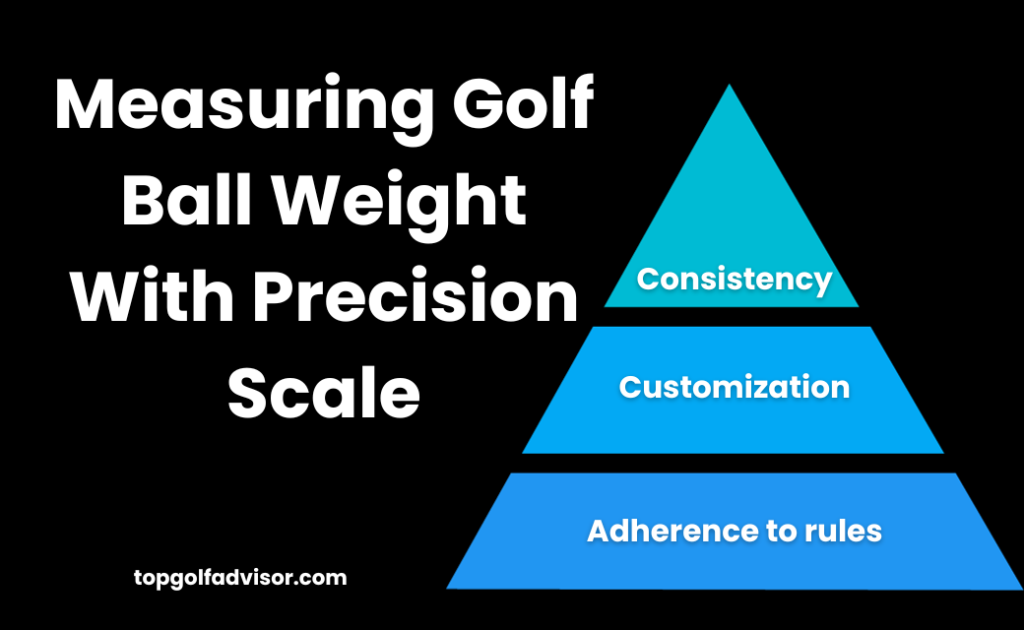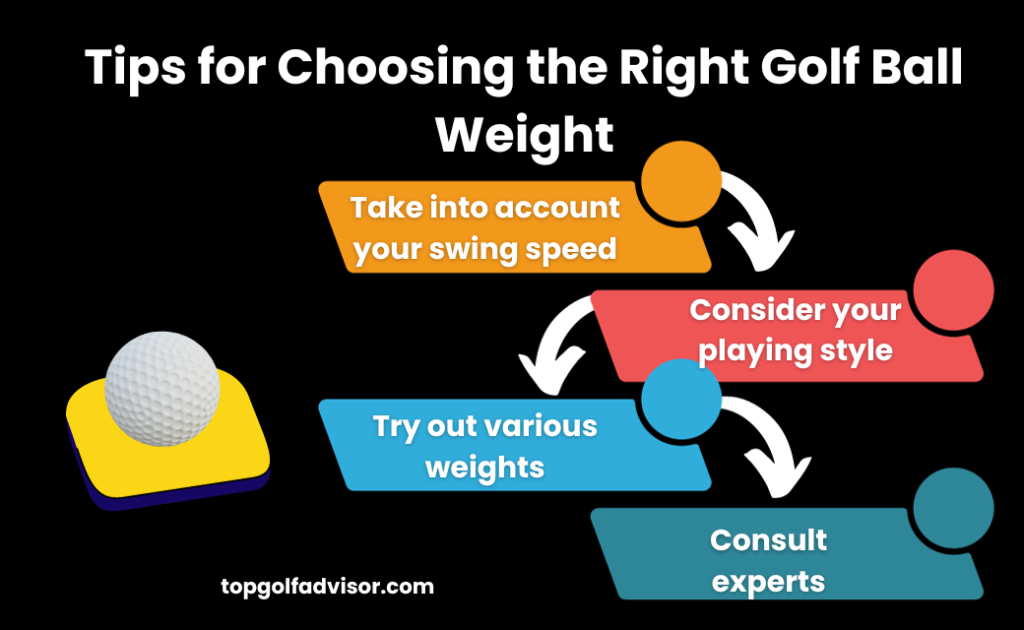Knowing how much does a golf ball weight is essential for every golfer. The average weight of a conventional golf ball is around 1.62 ounces or 45.93 grams. However, a golf ball’s weight can vary depending on several factors, including its design and construction materials.
Gaining the most out of your game requires comprehending the significance of golf ball weight. To ensure fair competition, regulatory bodies impose strict requirements that professional golfers must follow. Golf ball weight may vary slightly despite these recommendations because of manufacturing procedures.
To get the best golf ball for you, it’s critical to dispel certain widespread myths regarding ball weight. This post will examine the variables that impact golf ball weight, offer advice on selecting the ideal weight, and review how to keep weight constant.

What Is The Standard Weight of a Golf Ball?
The average weight of a golf ball is approximately 1.62 ounces, in case you were wondering. Professionals and amateurs use this weight, which golf regulations determine. This particular weight was chosen to maintain uniformity throughout the game.
A golfer wants the ball to go on a predictable route and cover a specific distance when they hit it. Golf balls with a standard weight will predictably play golf. Therefore, knowing how much does a golf ball weigh is crucial for all types of players.
There are other reasons why a golf ball’s weight is important. For instance, the ball’s feel when struck by a club is influenced by its weight.
Although a heavier ball could feel firmer and provide more distance, a lighter ball might feel softer and be simpler to control. Golfers frequently have preferences regarding the weight of their balls, and they could select a particular weight depending on their skill level and playing style.
It’s important to remember that golf balls come in various weights in addition to the normal weight. To accommodate varying player preferences, certain golf balls are made with a weight that is either lighter or heavier than conventional. Nonetheless, the average weight of 1.62 ounces offers most players the best combination of distance, control, and consistency.
What Are The Factors That Affect Golf Ball Weight?
The material a golf ball is made of is one important component that affects how much does a golf ball weigh. The weight of the ball is directly impacted by the densities of the various components.
The following three elements may have an impact on a golf ball’s weight:
Core Material:
Rubber or resin are two common materials for making a golf ball’s core. The density of the core material can greatly affect the ball’s weight. A higher overall weight can be attributed to heavier core materials.
Cover Material:
Surlyn and urethane commonly make golf ball covers. The weight may vary depending on the cover’s thickness and makeup. While some cover materials might be lighter or thicker than others, thicker covers generally cause the ball to become heavier.
Construction Design:
A golf ball’s weight can also be influenced by its shape and construction. For instance, the overall weight can be affected by multi-layered balls with extra layers or extra characteristics like dimples. A ball with a streamlined design could be lighter than one with more layers or features.
By thoroughly understanding these elements, golfers may choose the weight and efficiency of the golf balls they use on the course.
What Is The Importance of Golf Ball Weight?
Understanding the significance of how much does a golf ball weigh can significantly enhance your game and allow you to achieve optimal performance on the course.
A golf ball’s weight impacts its distance traveled and flight. Using a heavier ball in windy circumstances is advantageous since it will fly lower and spin less. On the other hand, a lighter ball has more spin and tends to fly higher, which can aid in controlling and halting power on the greens.
The feel and reaction you receive while hitting the golf ball are also influenced by its weight. A lighter ball might feel softer and give you more insight into your swing, but a heavier ball might seem more substantial and forceful. Achieving the ideal mix for your game and personal tastes is crucial.
The golf ball’s weight can also affect the swing’s speed and distance traveled. While a ball with more weight could need more work to get the same distance, a lighter ball might enable faster swing rates and greater distances. Selecting a ball weight that works for your swing type and enables you to play to your fullest on the course is essential.
Understanding the significance of golf ball weight can greatly enhance your performance. It has an impact on the ball’s feel, flight, and distance, all of which have a big impact on your total game. Spend some time experimenting with various ball weights to see which one best suits your style of play.
Professional Standards for Golf Ball Weight
Golf balls must weigh according to professional standards to promote precise play and fair competition. The Royal and Ancient Golf Club of St Andrews (R&A) and the United States Golf Association (USGA) state that a golf ball’s official weight cannot be more than 1.620 ounces or 45.93 grams.
These guidelines have been established by these organizations to ensure consistency and fairness for all golfers. All golf balls will behave predictably and have similar features thanks to a common weight. Professionals who depend on accurate shot placement and steady ball flight must understand this. When a golf ball weighs more than it should, it might give unfair benefits like longer reach and a different trajectory.
To enforce these rules, random ball testing of professional golfers is conducted throughout tournaments. This entails weighing their golf balls to ensure they adhere to the specifications. If a player is discovered using a ball that weighs more than the allowed amount, they may be penalized or eliminated from the competition.
In professional golf, the heft of a golf ball is crucial. Players must abide by the R&A and USGA rules to ensure precise play and fair competition. Golfers may trust that the shots will function as intended when the weight is kept constant, creating an even playing field for all players
How To Determine The Variations in Golf Ball Weight?
Specialty balls are made with certain features in mind, such as improved control or longer range. These balls can improve your playing because they often have special qualities like a tougher or softer cover.
With customization choices, you may imprint your brand or create a unique design on your golf balls to make them stand out from the competition.
How Much Does A Golf Ball Weigh: Specialty Balls
Specialty golf balls are available in varying weights to accommodate a range of playing styles. These balls are made to improve a player’s distance, control, or feel, among other facets of the game.
Certain specialty balls, for instance, are made to weigh approximately 45 grams instead of the typical 45.93 grams. More distance can be gained with these heavier balls, particularly for those who swing the ball more slowly.
However, certain specialty balls come in a smaller weight range (around 40 grams), which can provide better control and a softer feel. These balls can be more appropriate for players who swing faster or with a lighter touch.
Customization Options
Select from a range of options to make your golfing experience unique. Golf balls come with a variety of customization options to fit your tastes.
Choose your ball’s color first; you can go from a traditional white to a bright neon color.
To make your ball unique, you can add your logo or design. You can use your initials, a humorous phrase, or the logo of your preferred sports team—the options are unlimited.
You may adjust the ball’s compression level to fit your playing style and swing speed. While lower compression balls offer more distance for slower swings, higher compression balls are best for faster swing speeds.
Finally, consider how many dimples does an average golf ball have as it can affect its trajectory and control.
With so many customization options, you can create a golf ball that perfectly suits your game.
Measuring Golf Ball Weight
Accurate weight measurements of a golf ball need the use of precision scales. You can be confident about how much does a golf ball weigh by getting an accurate weight reading for the ball because these scales are made to give exact measures down to the last decimal point.
When determining the weight of a golf ball, accuracy is essential because even a small deviation can have an impact on the ball’s performance. Since tolerance establishes the permissible range of weight for a golf ball, it is also crucial to take into account.
Precision Scales
For a golf ball to weigh precisely and function at its best on the course, precision scales are necessary. These scales offer the precision required to ascertain a golf ball’s precise weight, which significantly influences its trajectory and distance travelled.
For keen golfers, accurate scales are essential for the following three reasons:
Consistency:
By ensuring that every ball they use weighs the same, golfers may minimize factors that could affect their game and promote consistent performance by using precision scales.
Customization:
Golfers can optimize their performance on the course by customizing their equipment to suit their unique tastes and playing styles by measuring the weight of their golf balls.
Adherence to rules:
The weight of golf balls is governed by regulations in several golf competitions. Players can ensure fair play and avoid penalties by using precision scales to verify that their balls satisfy the stipulated weight standards.
In the realm of golf, precision scales are essential because they give players precise measures that let them adjust their equipment and play to the best ability.

Accuracy and Tolerance
After learning how precise scales operate, let’s discuss how crucial tolerance and accuracy are when weighing golf balls.
Although limitation refers to the allowable range of error, accuracy describes how near an estimate is to the true value. Accurate measurements are essential for weighing golf balls to maintain consistency and fairness throughout the game. The trajectory and distance travelled by the ball can be impacted by even a small change in weight.
Strict tolerance guidelines are followed by golf ball producers to ensure uniformity in their output. These limitations guarantee that every golf ball in a given batch weighs between a reasonable amount and an acceptable amount.
By understanding accuracy and tolerance, you can appreciate the meticulousness required to produce consistent golf balls for a fair and enjoyable game.
Common Misconceptions About How Much Does A Golf Ball Weigh
Some widespread misconceptions about golf ball weight can affect your playing. First, a lot of people assume that a bigger golf ball would always travel farther and with more precision. It may not be the case, though, because other important variables like launch angle and swing speed also come into play.
Secondly, some players believe that their swing mechanics will be enhanced by a lighter golf ball. A lighter ball may be simpler to swing, but doing so may cause you to lose accuracy and control. To choose the right golf ball for you, it’s critical to be aware of some common myths. Discover the impact of golf ball variations, including how golf balls make a difference, on your overall game.
Impact on Distance and Accuracy
Wait until you swing the club with a precisely weighted ball to appreciate the incredible power and control that will come with it. One of the most important factors in deciding the distance and precision of your shots is the golf ball’s weight. This is how it affects your gameplay:
- Distance: Because a lighter ball can be struck faster, it usually travels farther. However, managing the direction can be more difficult.
- Accuracy: During the swing, a heavier ball offers greater stability and control. You may hit more accurate shots and keep your accuracy higher with its assistance.
- Personal Preference: You must determine the ideal ball weight depending on your playing style and preferences. Trying out various weights can assist you in finding the ideal fit for your game.
Effect on Swing Mechanics
Envision your swing flowing smoothly as your body moves through the golf ball’s perfectly balanced weight with ease. The golf ball’s weight significantly influences the mechanics of your swing.
The ball’s weight influences how easily and effectively you move energy from your torso to the clubhead during a swing. A heavier ball could take more work to swing, slowing down your speed and possibly impairing your accuracy and distance. Conversely, a lighter ball can make it possible to swing faster, but it might also be harder to manage.
Tips for Choosing the Right Golf Ball Weight
Achieving the ideal golf ball weight can make a big difference in your game. Both your swing mechanics and the flight and trajectory of a golf ball can be impacted by its weight. The following advice will help you select the appropriate golf ball weight:
- Take into account your swing speed. A softer golf ball might enable you to hit the ball farther if your swing is slower. On the other hand, a heavier ball can offer more control and accuracy if your swing speed is higher.
- Consider your playing style: A heavier ball might be more appropriate if you typically hit the bat more aggressively. It can assist you in keeping your composure and stop the ball from deviating off the path. A lighter ball will assist you in producing greater speed and distance if your swing is smoother.
- Try out various weights: It’s crucial to try several golf ball weights to determine which is most suitable for you. You can find the ideal weight for your swing and playing style by experimenting with different balls.
- Consult experts: If you’re unsure which ball weight to select, consider consulting experts or specialists in the game. They are able to assess your swing and offer suggestions depending on your particular requirements.

By considering these tips, you can find the right golf ball weight that can improve your game and help you achieve better results on the course.
Final Words
Consequently, understanding how much does a golf ball weigh can help you evaluate the performance ratio. It has a significant impact on feel, control, and distance in your game.
A golf ball’s typical weight is 1.62 ounces or 45.9 grams. Its weight, however, can be affected by components, materials, and compression. Selecting the appropriate weight for your playing style and swing speed is crucial.
To guarantee constant performance on the course, keep in mind to maintain a regular weight in your golf balls.
FAQs
Can the weight of a golf ball affect my swing speed?
Yes, the weight of the golf ball does affect how quickly you swing. Swinging at a heavier ball can be slower since it takes more effort to hit. On the other hand, using a lighter ball will accelerate your swing.
Are there any regulations regarding the maximum weight of a golf ball?
Yes, there are rules governing a golf ball’s maximum weight. A golf ball cannot weigh more than 1.620 ounces, or 45.93 grams, according to the Rules of Golf.
How much does the packaging of a golf ball contribute to its overall weight?
A golf ball’s packing usually adds very little to the ball’s total weight. Its lightweight design reduces any potential influence on the ball’s performance and range.
